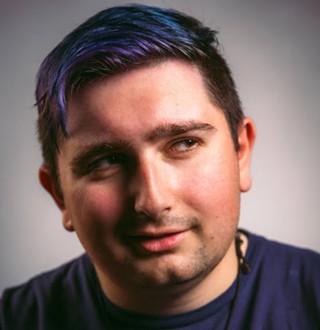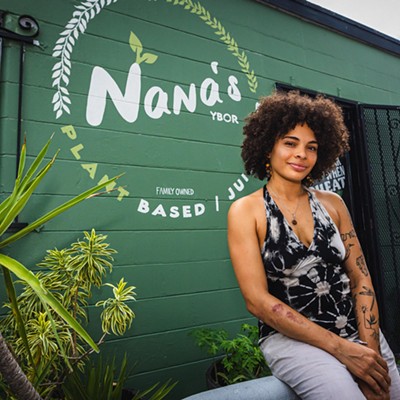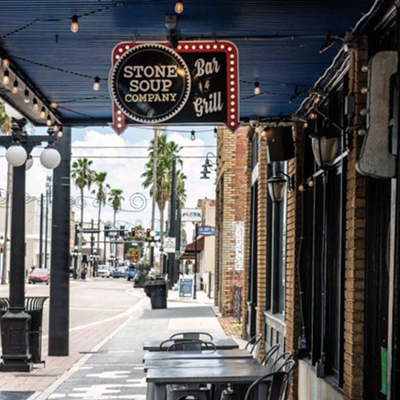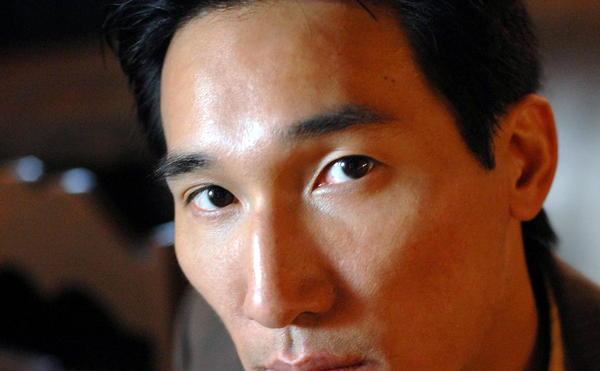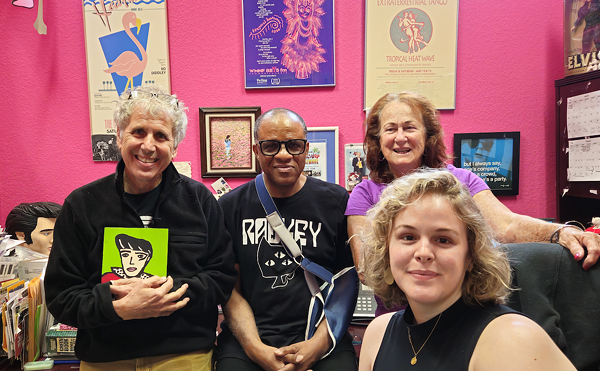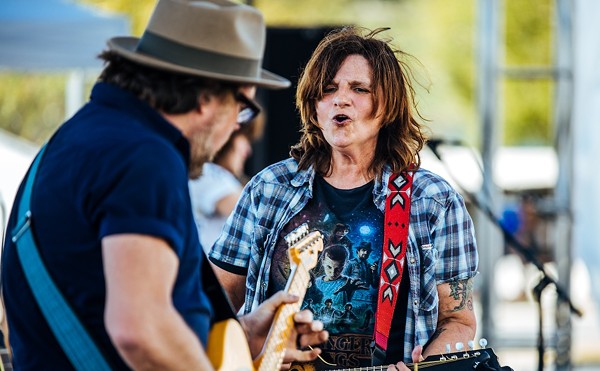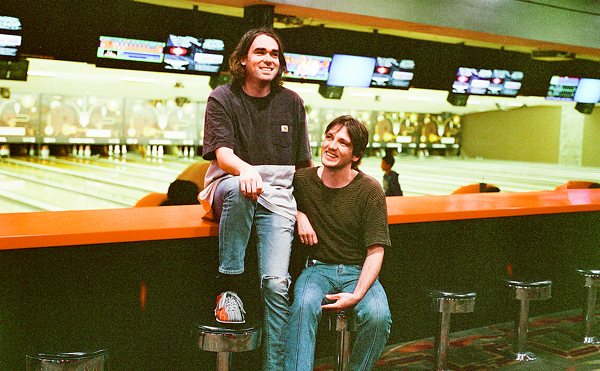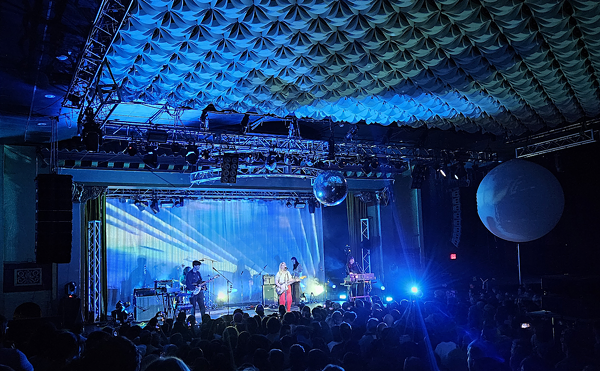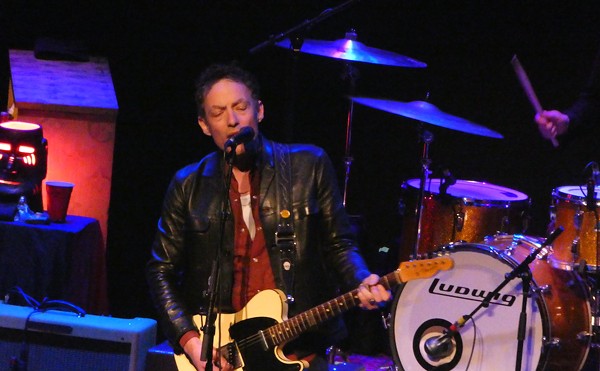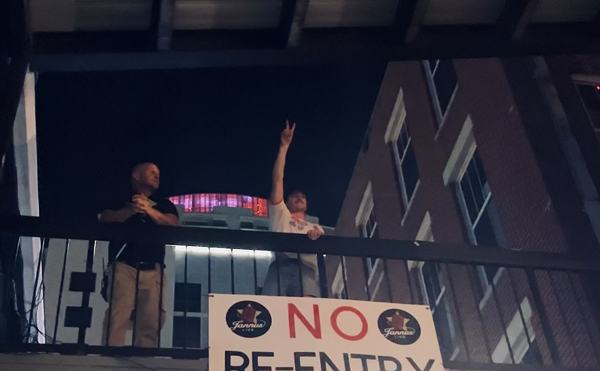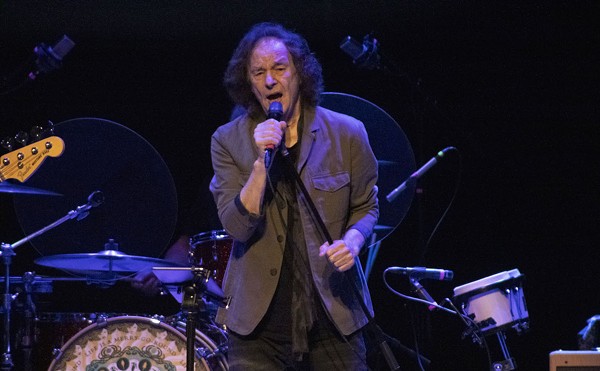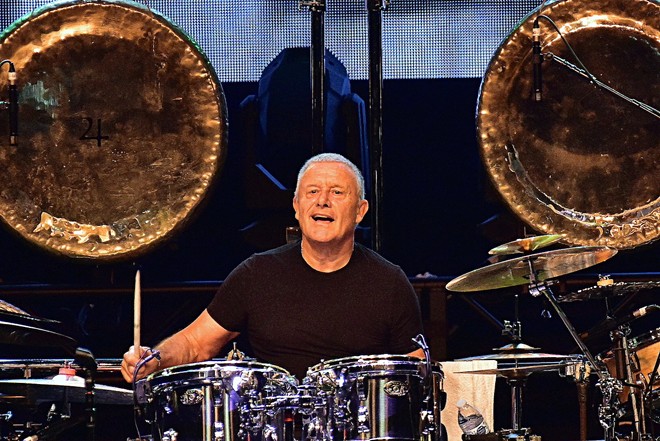
The 73-year-old sole survivor of Emerson, Lake, and Palmer has been planning a revival of some sort for a few years now, but finally found a way to execute it faithfully.
“What you hear audio-wise out of the PA is Keith and Greg playing, me live on stage playing, being mixed into those audio tracks, and on the screen is them performing those particular pieces completely in sync,” he told Creative Loafing Tampa during a recent phone call.
Palmer tried going the hologram route at first, but quickly came to discover how grossly exaggerated they are (read: Buddy Holly hologram).
“It's an impersonation, an actor dressing up in the clothes to get the body, get the angles, get everything right,” he added. “And then, you basically superimpose Keith’s face on that particular model, or Greg's face on the next model, or whatever. That didn't seem like a very honest approach.”
Luckily for the drummer, he came across a very low-selling DVD of when the prog super-trio was playing at its absolute best at London’s Royal Albert Hall in 1992. The real kicker was that every instrument—and Lake’s vocals—had its own audio track, meaning that with a little cleaning up, one could remix the material to absolutely no end. Oh, and there were five cameras at work that night at Royal Albert Hall.
So Palmer got to work.
Mixing the audio was a piece of cake, but to him, the hardest part of producing “The Return of Emerson, Lake, and Palmer”—which stops at Clearwater’s Ruth Eckerd Hall on Friday—was editing himself out of the 32-year-old video footage he’d be using on two screens on either side of the stage, which will display Keith and Greg playing the exact audio being used.
Some sources compare this show’s technology to how Paul McCartney duetted with John Lennon’s isolated vocals—and film footage to sync up to it—on “I’ve Got A Feeling,” during his “Got Back” tour two summers ago. And Palmer isn’t at all a stickler about adapting to technology, including AI. He’s open to expanding the show by toying around with more material (with approval from his fallen brothers’ families), and is even fascinated with the idea of paying tribute to Asia in a similar manner.
Tickets to see The Return of Emerson, Lake, and Palmer at Clearwater’s Ruth Eckerd Hall on Friday, Feb. 23 are still available and start at $35.
Read our full Q&A with Carl Palmer below.
Thanks for doing this with me today, Carl. I've read into this tour like crazy, and you said that it took you eight weeks to edit this whole thing. You’ve also expressed how the idea of having Keith Emerson and Greg Lake on the screens is infinitely better than doing physical holograms. While I agree with that sentiment, what was it about holograms that turned you off?
I’ll give you the technical side of stuff for when you have a DVD like I had, of the band playing at the Royal Albert Hall. That particular DVD was a five-camera shoot, which meant that a lot of work was already done for me. Setting up a hologram, which is completely phony, isn't Keith Emerson or Greg Lake: It's an impersonation, an actor dressing up in the clothes to get the body, get the angles, get everything right. And then, you basically superimpose Keith’s face on that particular model, or Greg's face on the next model, or whatever. That didn't seem like a very honest approach.
What we have here is Greg and Keith at their very best performing live, and the only reason I could do this was because of the audio track from that evening. Everything was recorded separately. The drums, all of the keyboards, the voice, bass guitar, the lead guitar, everything was recorded separately, which meant you could take things away, or you could add things or you could rerecord it, because it's all there to mix and remix. So, being able to take all of my drums away and just be left with keyboards from Keith, and voice and bass guitar from Greg that I could actually mix again, anywhere in the world or any theater, means that I can play along with that in a live situation. I could actually play the drums that I’d just removed, live.
I figured it was a better option if I could make all the timelines add up, make sense, and be perfectly in time with them singing and playing. So what you hear audio-wise out of the PA is Keith and Greg playing, me live on stage playing, being mixed into those audio tracks, and on the screen is them performing those particular pieces completely in sync. That seemed to be, to me, a better way of doing it than the hologram way, because technology allows us to do it today, providing that you’ve got the right material. The only way it was possible was because of the audio tracks being done individually, which meant I could wipe stuff clean, meaning me.
When I spoke about eight weeks of editing, that was getting me out of the frame on the screen. When you see a cross-shot of Greg singing, you’d see me in the background from the Royal Albert Hall. Well, I had to get that out because I don’t want you to see that on the screen; I only want you to see him. And when it was my turn to be on the screen, I'd have a camera on me and my drumset in the theater where we're performing. So there I am, 30 years later on the screen, and on each side of me is Keith Emerson and Greg Lake from the Royal Albert Hall, singing and playing perfectly in sync, and all of the audio being mixed that night, for that theater, for that room, for that moment in time. Sounds a better deal to me, Josh.
Totally. So, I know you said that you did a lot of cleaning up in the production process, but when you were first rehearsing the drum parts for this show, were there any irregular drum parts from that night at Royal Albert Hall you had to get used to? Like, did you play anything differently that night than you usually do?
Yeah, some of the parts I’m playing slightly differently now in the live situation, and some of the sounds that I got from the drums—because I triggered some electronic pads—I actually keep in the mix, along with my acoustic drums you're hearing live. So, my actual click track that keeps me in time is the original drum track I have in my monitor that I played really low, and it's completely stripped down to the basic thing, just to keep me in time. But there are some sounds on there, which I did keep, like in “Paper Blood,” I kept some of the Dawes Pad, which is an electronic pass that triggered a kind of reverb-y sound that was mixed into an acoustic snare drum sound. I keep that in with the sound I’m producing that night. So, anything that I could keep and reuse, I did. But basically, I play all the stuff again as it was.
Gotcha. So, when Emerson, Lake, and Palmer were together, did you guys record a lot of shows separately like that?
Only when we were going to make a DVD. When we did our very first documentary, we let the BBC here in England record everything together, so we didn't have any flexibility of cleaning up tracks. Well, we could clean them up, but certain parts would always be there because it was not a separate track. All the music went down at the same time that all the visuals went down. When we had made that documentary, we realized that in the future, we needed flexibility when we’d be doing any visual recordings or any visual sort of encounters for the band. So, when we recorded at the Royal Albert Hall, that was the first thing at the top of that hit list, saying “Hey, all of the audio has got to be recorded separately, so we can remix it, we can overdub it, repair it, or whatever has got to be done.” So, that was the only time we ever did it.
I'm grateful that we did, and what's really good here—it wasn't good at the time—is that when that DVD came out, it was released on Sanctuary, and worldwide, I did the research on it, it sold about only 12,000 copies, mainly because Sanctuary suddenly decided to sell their company to Universal, and this went between the cracks. It dropped between the chairs. It went missing, and Universal didn't jump on it and promote it. And there was nothing that we could do at the time, we couldn't stop the sale, so it sold very few copies, which is really good for me, because it means that it's not that popular and people haven't seen a lot of this. Practically nobody's seen it, so it's all still very fresh, and that seemed another good reason to use it, especially because it was of the quality that I needed, and better than a hologram.
You’ve said that you're doing seven songs with the footage of Keith and Greg, while everything else, the instrumentals I'm assuming, is going to be with your band.
Yeah, that's right, with Paul [Bielatowicz] and Simon [Fitzpatrick]. I do things with Paul and Simon like “Tarkus,” which is a 15-minute piece. They play all the synthesizer sounds from their guitars because there's outboard gear and plugins you can use today that make all that happen, and Paul sings the “Stones of Years” movement and the other songs in “Tarkus.” I do “Benny The Bouncer,” which is from the Brain Salad Surgery album. I sing that particular song. We do “Carmina Burana,” which was kind of an ELP jam song, but written by Carl Orff, which features my drum solo. We do “Hoedown” together as a band, which is from the Trilogy album from the “Rodeo” suite by Aaron Copland.
So, it's a mixture, but all of this is intertwined together. There's not six with Keith and Greg, and then six or seven with Simon and Paul. They're all built into a show, so it's got a flow to it. And then, in the last third of the show, all you see is Keith Emerson and Greg Lake up on the screen doing “From The Beginning,” “Lucky Man,” “Still…You Turn Me On,” “Knife-Edge,” into “Rondo” and all that stuff. So, it's mixed up in such a way that it makes sense if you follow.
Yeah. Now, let's say that you do this exact show for a really long time. I hope you do. But surely, there will come a time in which you'll want to dig a little deeper into ELP's catalog for the show. Considering what we can do with AI right now in terms of separating tracks, would you consider dissecting a different show you guys filmed?
Yes! I’ve already experimented with the AI program I'm using at the moment to clean up some of the graininess because obviously, the quality is not IMAX. It was done in the early 90s, so it's not as good as going into an IMAX movie theater. But the AI program has cleaned it up considerably, getting rid of a lot of overspill on red lights and smoke and stuff, which we didn't need at the time. So, I've used AI already. I do have ideas, though. I've found two other pieces to be integrated into the show. They need to be AI treated, they need to be edited, and once that's done, I'll present them to the Emerson family, and I'll present them to the Lake family, and providing they're in agreement and they like what they see of their husband or their father, in Emerson's case, I'll put them into the show.
I'm not ready to do that just yet, but I'm prepared to start on it, and I have the material. I now have the technology with this AI program, which is absolutely fantastic, to make it as good as I possibly can. I can't tell you what the pieces are going to be, because if I don't use them, I don't really want the word getting out in case there’s a problem with one of the families or it doesn’t work out, so it's not worth saying at the moment. But I do have two very, very strong contenders.
Wow, cool. So, let’s step outside this tour a little bit. I wanted to talk about another show of yours that I saw. I caught the ELP Legacy Band on the Royal Affair Tour in 2019, with Arthur Brown as your frontman. Obviously, you drummed for Crazy World of Arthur Brown before making it bigger with ELP, and 50 years later, he did a few leads for you. What drove you to call him up for that gig?
Well, in actual fact, it didn't work out the way we thought it was going to on the Royal Affair tour. Originally, Arthur was just going to be an emcee. He was going to be announcing the groups on, because you know, there was John Lodge, there was my band, there was Asia, all that stuff going on. For us, we figured it'd be nice to have like, a character that could weave it all together. Anyway, Arthur got a little bit unhappy with that idea, even though it seemed to go down well at all of the meetings and the various Zoom calls we had.
I don't want to throw anyone in particular under the bus here, but they did want to carry on doing that, so Arthur was kind of stuck doing very little, except singing “Fire,” and trying to sing “Karn Evil 9.” I just used him with my band, and it seemed to be the best way out. We could use him as an emcee as somebody who connected all of the groups together throughout the evening, and that was it, really. We just made the best of what we could there. It still worked out well, but it possibly could have been a bit better if we'd all been a bit more receptive to the idea of giving it a chance. But some people didn't want to give it the chance, even though they agreed to do it.
I get that. You mentioned Asia, and I absolutely loved Asia's performance on that tour. I loved Bumblefoot as a frontman, but would be open to doing something similar to the ELP tribute for Asia and John Wetton?
The footage isn't there to actually do that at the moment. I can't say that I wouldn't look into that, I just haven't had time to do that. I would look at playing Asia music, and I am thinking at some stage in my life, I'd like to do something like “A Lifetime in Music Celebration” tour, and have a situation where I've got Asia on stage for the first 50 minutes, a break, and then, for an hour and a half, I’ll have ELP music. How I would construct that and how I would put it together, I don't know. But I would definitely like to sort of do something with Asia again, whether or not it would be with Geoff Downes. I don't know how he feels about that, whether or not it would be the idea that you just mentioned with John Wetton. Who knows? I mean, it’s possible. It could all be done, and I don't see why it shouldn't be used, you know? So I just have to look at that, really.
This interview has been edited for clarity and length.


